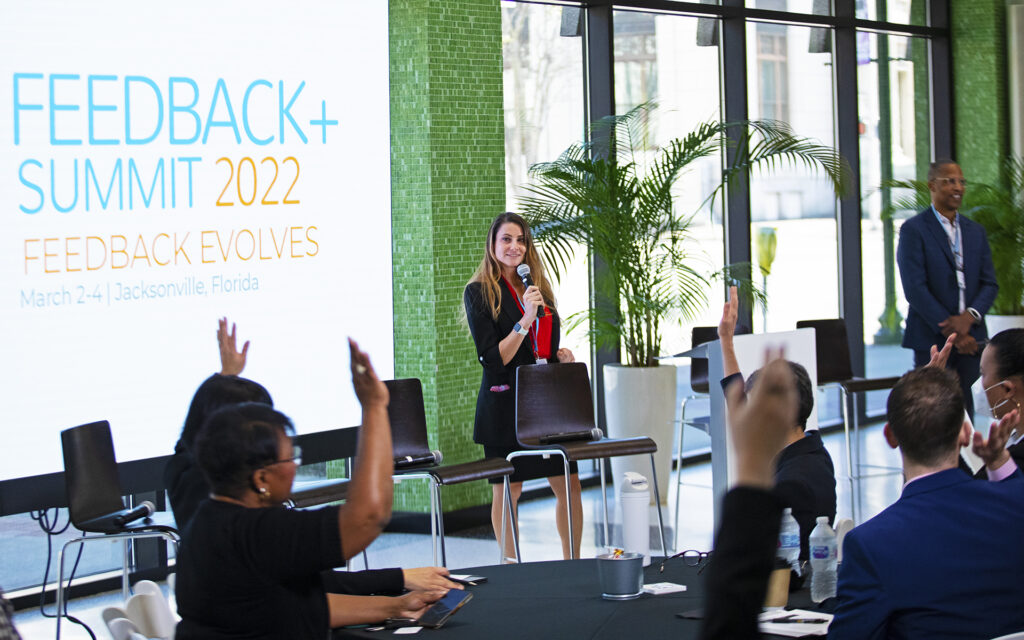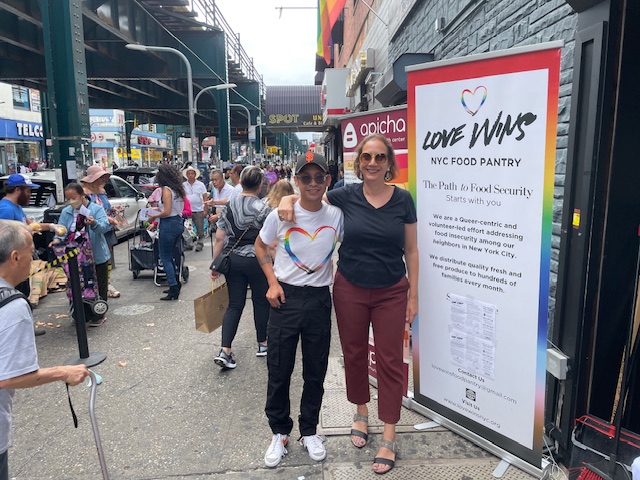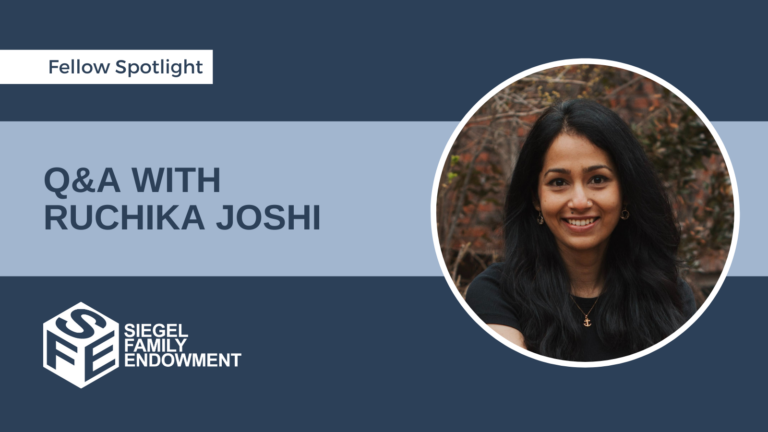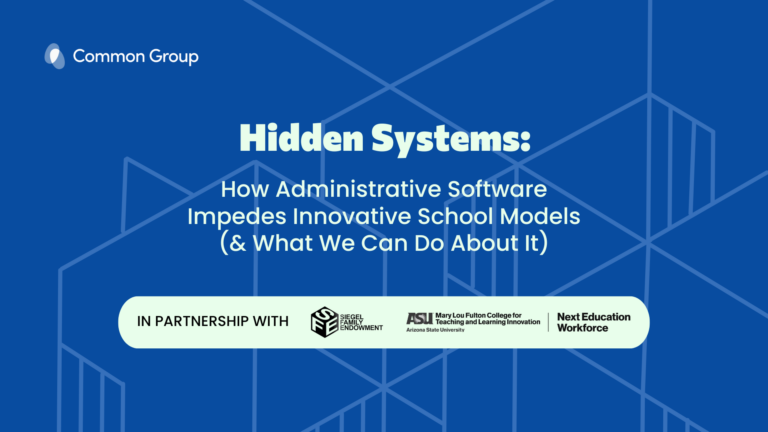Feedback Labs is Driving Impact by Promoting Incentives, Providing Tools and Training, and Creating Community around Feedback and Listening Practices

Feedback and listening aren’t nice-to-haves for nonprofit organizations, funders, aid groups, and governmental agencies. They’re essential if those organizations are to effectively serve the community and to center their work on equity. That’s the thinking behind Feedback Labs, a nonprofit organization that provides tactical support and structured learning opportunities for organizations that want to include feedback and listening practices in their work and decision-making processes.
We sat down with Feedback Labs’ CEO Britt Lake to discuss Feedback Labs’ model, the impetus for the organization’s development, how its priorities and strategies have shifted over time, and the benefits that organizations and communities can realize from listening and acting on feedback from those at the heart of their work.
Where did the idea for Feedback Labs come from? What challenges were you seeking to address?
Feedback Labs started almost ten years ago as an informal lunch group of eight internationally focused nonprofits. What brought us together was a shared belief that the way international aid and philanthropy currently worked was flawed. It didn’t sit well with us that anyone with the funds could make decisions for and run programs in communities where they had little personal experience and may not have even visited.
Each of the groups focused on different parts of the international development sector, but what brought us together was the belief that people and communities should have a say in the programs and policies that affect their lives.
At the time I was Chief Program Officer at GlobalGiving, the world’s first and largest global crowdfunding community. At GlobalGiving, we were working to get funds to community-based organizations around the world with the idea that the closer funds are to communities, the more communities will be able to drive the decisions on how those funds are used. Feedback Labs takes it even a step further—to not just listen to organizations that are community-based, but to listen to individuals that are part of those communities.
How did you decide on a strategy for achieving that goal? How did you settle on the approaches that would ultimately become the core of Feedback Labs?
In the early years of this group, we spent some time thinking about where we could—as a collective—be more powerful than as individual organizations in moving forward the practice of listening and acting on feedback. Rather than organizing ourselves as consultants or advisors, we saw ourselves as field builders—working with others to promote high-quality listening and acting on feedback.
Our initial strategy focused on three areas: The first was framing, the idea that we need to make sure we’re all using the same language to have common definitions and understanding of good feedback, the feedback loop, practices around listening, and other foundational concepts. The second was mainstreaming, or thinking about how we move ahead the ideas and the practices of feedback into larger organizations such as the World Bank or United Nations organizations. These organizations are moving so much money, and affecting so much of this space, that if we can get feedback practices embedded into those organizations, it would make seismic shifts. And the third strategy was around convening, bringing people together to share knowledge and experience around feedback.
How have those strategies and priorities shifted over time? Have you made any adjustments to Feedback Lab’s approach? Why?
When I joined Feedback Labs as CEO in early 2019, we took the opportunity to re-examine our strategy. Much of what we had set out to do in our initial strategy had been achieved. Our work around framing the language around feedback, for instance, had moved forward and was no longer a top priority of focus.
We took stock of where we had been, where the field was and could go, and Feedback Labs’ own strengths and refocused our efforts on three areas. The first is around realigning incentives to encourage better listening among nonprofits and foundations. As an example of this work, we convene a group of the leading nonprofit ratings platforms—groups like Guidestar by Candid and Charity Navigator—to create a shared self-assessment tool, called How We Listen, for nonprofits to assess their own listening. This tool feeds into nonprofit ratings to reward nonprofits that are listening well. We also facilitate a Feedback Incentives Learning Group for philanthropic leaders and foundations to test and share learnings about how to incentivize feedback and listening within nonprofit spaces and among each other.
The second piece of this strategy is to provide access to tools and training to encourage high-quality and equitable listening and acting on feedback. If we’re going to incentivize nonprofits and foundations to listen and act on feedback, we want to support them to do so in smart, effective, and inclusive ways. We provide introductory webinars, Feedback Crash Courses, advanced trainings, and a tools repository to support better listening.
The third piece is around building the community around feedback practitioners. We want people to feel connected to the feedback field so they can share knowledge and support each other’s efforts. Each year, we bring together the community through our Annual Summit, and have a thriving Fellowship program to support champions in the feedback field.
We’ve also expanded the way that we talk about feedback to include the broader practice of listening. Early on, we talked primarily about feedback, which is a response to specific action or program. Listening, however, allows us to consider how to co-create and include those at the heart of our work in order to develop strategy. We want to move beyond making tweaks around the edges or gathering feedback exclusively on what we already did. We want to take a broader approach to thinking on a strategic level, to consider things that we’re not doing that we should be doing and identifying the gaps in our thinking.
What is Feedback Labs’ central argument about the value of adopting feedback and listening practices in nonprofit and funder organizations?
We believe that feedback is the right thing to do, the smart thing to do, and the feasible thing to do. We believe it’s right, morally and ethically. People should have agency in their own lives and should have a say in the programs and policies that affect their lives.
Feedback is also the smart thing to do. Incorporating high-quality listening and acting on feedback in your programs leads to better, more equitable outcomes. When we first started talking about the positive link between feedback and outcomes ten years ago, we had mostly anecdotal evidence from having observed that to be the case, and having seen it in the for-profit sector. In the last decade, however, we are increasingly seeing research that supports the link between feedback and better, more equitable programmatic outcomes. We have a growing body of evidence that shows not just a positive link between high-quality feedback and smarter, more equitable outcomes, but that the act of providing feedback in-and-of itself is associated with positive outcomes.
Finally, collecting feedback is feasible to do at scale. There is a growing repository of methods and tools an organization can use to listen and act on feedback from those at the heart of their work that range from free to bespoke. While the act of listening and acting on feedback is not cost-neutral, even a small staff can carry out smart feedback practices across their programs with positive effects.
How does this work in practice? What examples of impact are you seeing when nonprofit and funder organizations incorporate feedback and listening practices?
The Pace Center for Girls is a nonprofit that does a great job of incorporating listening into its work. Pace’s mission is to provide girls and young women an opportunity for a better future through education, counseling, training, and advocacy. Founded in 1985 with ten girls at one center in Jacksonville, Florida, Pace now serves more than 3,000 girls a year at 22 locations across Florida and Georgia.
Feedback is core to Pace’s learning agenda and supports, and the organization incorporates formal and information feedback into their day-to-day work when discussing issues affecting program implementation and improvement. For example, Pace girls help to vet questions used in their program evaluation activities, as well as help to make sense of the findings that come out of those surveys. They use these experiences to gain a deeper understanding of the girls’ experience and how to improve the program.
For anyone interested in seeing more examples of feedback in practice, the Fund for Shared Insight, a national funder collaborative supporting listening and feedback, features a number of great case studies on their website.
How can organizations who want to avoid such pitfalls get started on incorporating feedback and listening practices as a way of understanding community voice and perspective? What mechanisms can they leverage?
One first step is to make sure you’re truly committed to listening and acting on feedback, and to understand where and when you can incorporate feedback from those at the heart of your work. What does listening to feedback mean for your organization? Where are you open and able to shift advisory or decision-making power to constituents? Don’t seek feedback on your strategy, for instance, if you’re not open to change your strategy based on that feedback. That can cause constituents to lose trust in you and your organization.
Once you understand where and when you will incorporate listening in your work, try to understand how to make it as easy as possible for those at the heart of your work to give you that feedback. Is email, text, or written survey easiest? What languages do you need to collect your feedback in? Are you reaching previously overlooked segments of the communities at the heart of your work? How much time are you asking people to commit, and are you compensating them for that time?
Finally, what’s your plan for closing the loop? How will you respond to the feedback you get, and how will those you gave you that feedback know that you truly listened to what they said? One great example of this is The James Irvine Foundation’s listening tour in communities through California. Not only did they use what they heard to inform their work, but they shared what they heard with the public.
Feedback Labs offers trainings and other resources for organizations that want to start or improve their feedback practice.
How can organizations learn more and get involved?
Feedback Labs exists to support people and organizations to listen and act on feedback from those at the heart of their work for better, more equitable outcomes. We have tons of resources and opportunities for people to engage and get the support they need no matter where they are on their feedback journey.
- For those who want training, we offer a self-paced Introduction to Feedback Mini Course, as well as live, public and custom Feedback Crash Courses throughout the year.
- For funders who want to better understand how listening and feedback can play a bigger role in philanthropy, joining our Feedback Incentive Learning Group might be useful to learn and explore in a community of their peers
- For people who want to spend some time brainstorming around a feedback-related challenge, we offer free virtual collaborative brainstorming sessions, called LabStorms, every other Thursday.
- For anyone who wants to connect to the community, learn more, or share their own feedback-related work, our annual Summit is a great event to attend (or sponsor!)
####
Britt Lake is Chief Executive Officer at Feedback Labs. She has long experience in leadership roles at international aid and development, including at GlobalGiving, the world’s first and largest global crowdfunding community.
Read more about Feedback Labs here.





